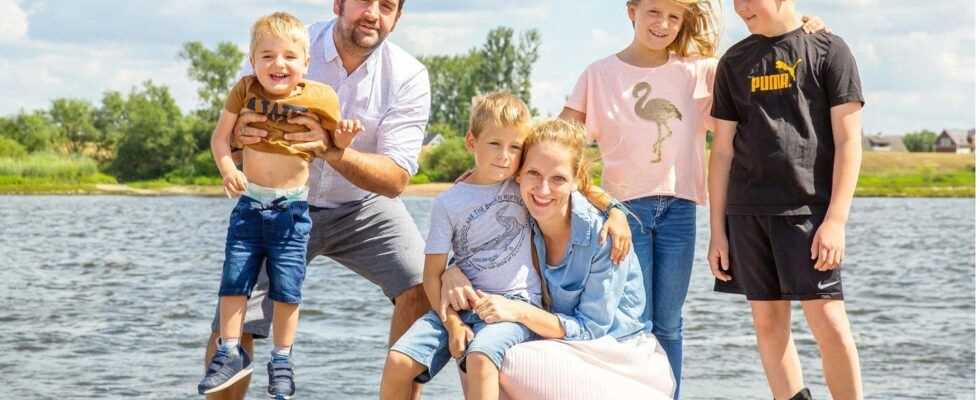Edda's fourth child is born with a very rare, severe liver disease. Contrary to all forecasts, her son survived thanks to an organ donation. Here she tells the story of uncertainty, waiting and hope – and the gift that saved Kalle's life.
When I realized four years ago that I was pregnant with our fourth child, our son Ben was seven, our daughter Lotta five and our youngest child, Jeppe, was two years old. Actually, my husband Jan and I had finished our family planning. Another pregnancy did not fit into my plans at all, because at the time – I was 30 – I was almost finished with my medical studies and wanted to finally start my professional life. But after I had overcome the first shock and our children were really looking forward to the little sibling, we looked forward to the future positively and imagined our future life as a group of six wonderfully.
The question of the disease
The birth was quick and beautiful, I was very relaxed, it was already my fourth child. Our son, whom we have named Kalle, was a bit sleepy after the delivery and could not keep his temperature well, which I dismissed as a result of the rapid birth. We were infinitely happy with our healthy new family member and shared the good news with all friends and relatives. Unfortunately, Kalle and I weren't allowed to go home straight away. Because the amniotic fluid was green, he had to stay in the clinic for 72 hours for observation. And I wanted to go home and have a cozy bedtime with my siblings and my husband! But at least the breastfeeding worked wonderfully, and I enjoyed our great happiness.
The next morning Kalle was extremely weak. Pediatricians were called in. I still haven't thought anything about it, as my other children were quite tired for the first few days after the birth. The pediatrician looked tense. A few tests showed catastrophic values, I had to leave the room. That was the moment when I realized: our son is looking bad. The rose-colored mother-hormone-intoxication glasses were swept away.
From then on everything went very quickly. Kalle was transferred to the intensive care unit at another hospital. I was left alone in the maternity ward and waited for my husband. After what felt like an eternity, we arrived at the children's clinic and found our son completely hosed and bleeding in an intensive care bed. His blood clotting stopped working. He was given large amounts of medication to keep his cardiovascular system from failing. But no one could tell us what illness he was suffering from. The doctors suspected a metabolic disease. From my studies I knew that metabolic diseases are difficult to treat, if at all. That was the worst day of my life.
Chances of survival uncertain
Our son was transferred again to the nearest university hospital. My husband and I sped after in the car. It was now night. Nobody opened us up in the children's intensive care unit. We had no choice but to wait. It felt like our son was drawing us like a magnet somewhere behind those walls. I would have loved to smash the door to pieces. My bedtime was forgotten, from now on I changed my templates to public hospital toilets, aftercare and hip baths were the last thing I thought about.
At some point during the night a very nice doctor opened the door of the intensive care unit and told us that they had not finished the diagnostics. We had to keep waiting. Well after midnight we were allowed to see our son briefly. We were told that his condition was very critical and that it was not known whether he would survive the night. We will be called when our son begins to die.
We stayed in the clinic and slept on the visitor sofa in front of the intensive care unit. Under no circumstances did I want to let my son die alone in this cot far away from us, I really wanted to hold him in my arms in case it came to that. But as if by a miracle he survived that night.
Kalle's liver was completely destroyed
The next day no one could tell us what illness our son was suffering from. That was the worst for me: this uncertainty. I wanted to know our opponent and be able to adjust to something. As absurd as it sounds: When we finally got the diagnosis later and were told that 90 percent of the children with it were dying, I felt relief at first. We finally knew what we were dealing with. But it wasn't that far yet. We drove home briefly to explain the situation to our relatives and the waiting children and to catch up on some sleep. Once there, a "Welcome, little brother!" Garland and lots of greeting cards and gifts for Kalle were waiting for us.
Several terrible days, many examinations and conversations later, the doctors were able to tell us what our son was suffering from: a very rare disease called neonatal hemochromatosis, a liver disease in newborns. At that time, there were only about a hundred described cases worldwide, almost all of which had ended with the death of the infant. Kalle's liver was completely destroyed. So it wasn't a metabolic disease, as was initially assumed, but rather I had developed a kind of autoimmune disease during pregnancy in which my body produced antibodies against the liver of my unborn child. I got insane, completely insane feelings of guilt: Hadn't I intuitively rejected this pregnancy at the very beginning? And now my body had fought the child? So in the end, wasn't it my fault, my psyche? Of course that was total bullshit, but it felt awful.
Kalle's only chance of survival was a liver transplant. However, due to the severity of the disease, which was accompanied by multiple organ failure, the brain was not adequately supplied with oxygen, so that our son's disability was to be expected. In addition, the doctors said the chances of surviving such a major operation in this condition are very slim. It is our decision whether we want to go the liver transplant anyway or whether we want to let our son die.
Finding a donor organ
The question did not arise for me at all, I immediately informed the doctors that we wanted a transplant. What I didn't expect was my husband's reaction. He said he couldn't decide that right off the bat. I had been convinced my husband and I both had the attitude that a life with a disability is just as worth living as one without. Basically, we were in agreement, but he was afraid that we would expect more from our son, his siblings and us than we could bear. In the end, we decided to have a liver transplant together. From that moment on, my husband never questioned anything about Kalle or our life with him again.
Unfortunately, we parents were out of the question as donors. We have the correct blood type, but my husband's liver was too big and I was not allowed to donate because I had just given birth and the risk of surgery would have been too great for me. It felt to me like my child fell into the water and I couldn't jump after it to save it. The following days were marked by waiting for an organ. Which, if you think about it carefully, means that you are waiting for the death of another person. Dreadful. This other person doesn't die because of us, I kept telling myself. I read a lot about organ donation on internet forums. Since then, I've been able to say that if I had one wish, it would be that people would be better informed about it. I had to read posts in which people urged not to donate a liver under any circumstances, since it only goes to alcoholics who did not deserve it anyway …
Twice we got a call that a suitable donor organ might have been found. Unfortunately, with these organs, the parts of the liver taken for a child turned out to be too large. (In liver transplantation, the donor organ is divided into two parts so that an adult and a child's life can be saved.) When our son was 15 days old, a lot of doctors suddenly came into his room and said it was going to start . I accompanied Kalle to the operating room and gave him a kiss there, the first and perhaps the last since his poor condition. It was night again. This time my husband and I slept on the clinic premises, this time in the car. Even now we didn't want to let our son go alone if there were complications during the operation. When we hadn't heard anything after twelve hours of operation, I snuck into the intensive care unit under an excuse. There I was able to take a quick look at my son, surrounded by doctors and nurses. Once again, he had survived.
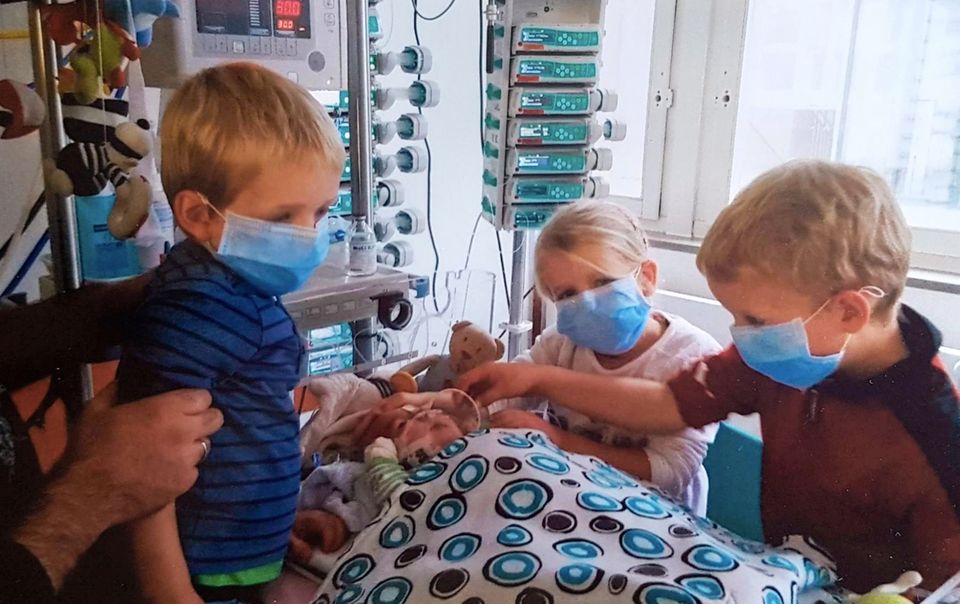
18 operations, nine weeks in a coma and four months in intensive care
Kalle was operated on a total of 18 times. There were various complications, from blood poisoning, thrombosis and kidney failure to a ruptured bowel, and then all over again. He was in an artificial coma for nine weeks and in intensive care for almost four months. But in the end he fought his way through. He was nine weeks old when we were allowed to poke him for the first time. He had tubes everywhere, his stomach was still open and you couldn't move him if possible. But he was in my arms and tears ran down my face with happiness. What a moment!
It was only when we left the intensive care unit after almost four months that I realized that I was now the mother of a severely disabled child. So far, the focus has been on pure survival. Our son was fed with a gastric tube and initially had to take medication every two hours, including at night. But I was incredibly happy to finally be able to do something for him. The approval for breast milk nutrition soon came. So far I had pumped five times a day for four months and poured the milk down the sink, because nobody has such a large freezer.
Just before he was released from the hospital, I asked for a prognosis regarding his disability. The child neurologist said you couldn't make a reliable statement about this, time would tell. That frustrated me, I just wanted to be able to adjust to something. I kept asking myself whether my son would sit at the table with us, whether he would smile, whether he would notice us. But actually my question was whether he could be happy. It was much easier for my husband, he just took our son as he is, he didn't need a prognosis. It was very clear to him: Our son will be a happy person.
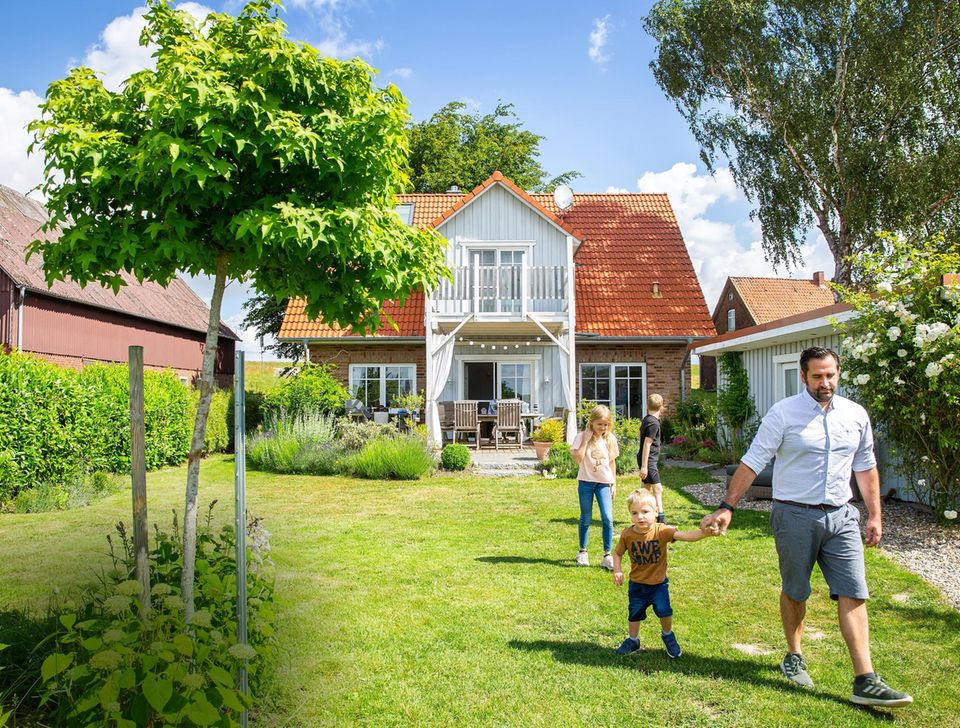
An exceptionally happy family
I have often asked myself whether the organ donor would have liked to donate his liver to a disabled child. Because of our son, an able-bodied child was not given an organ. Is that fair? I wouldn't have to ask myself these questions if there were enough donor organs. The gratitude we feel towards the donor and his family cannot be expressed in words. Nevertheless, we are incredibly sad that this family has lost a loved one. Always on the anniversary of the transplant, we sit together in the family circle, thank the donor for his or her generous deed, light a candle for him or her and think about the bereaved. Only through this person is our son fortunate enough to be able to live. We would have liked to get in touch with the bereaved family, but unfortunately the law doesn't allow that.
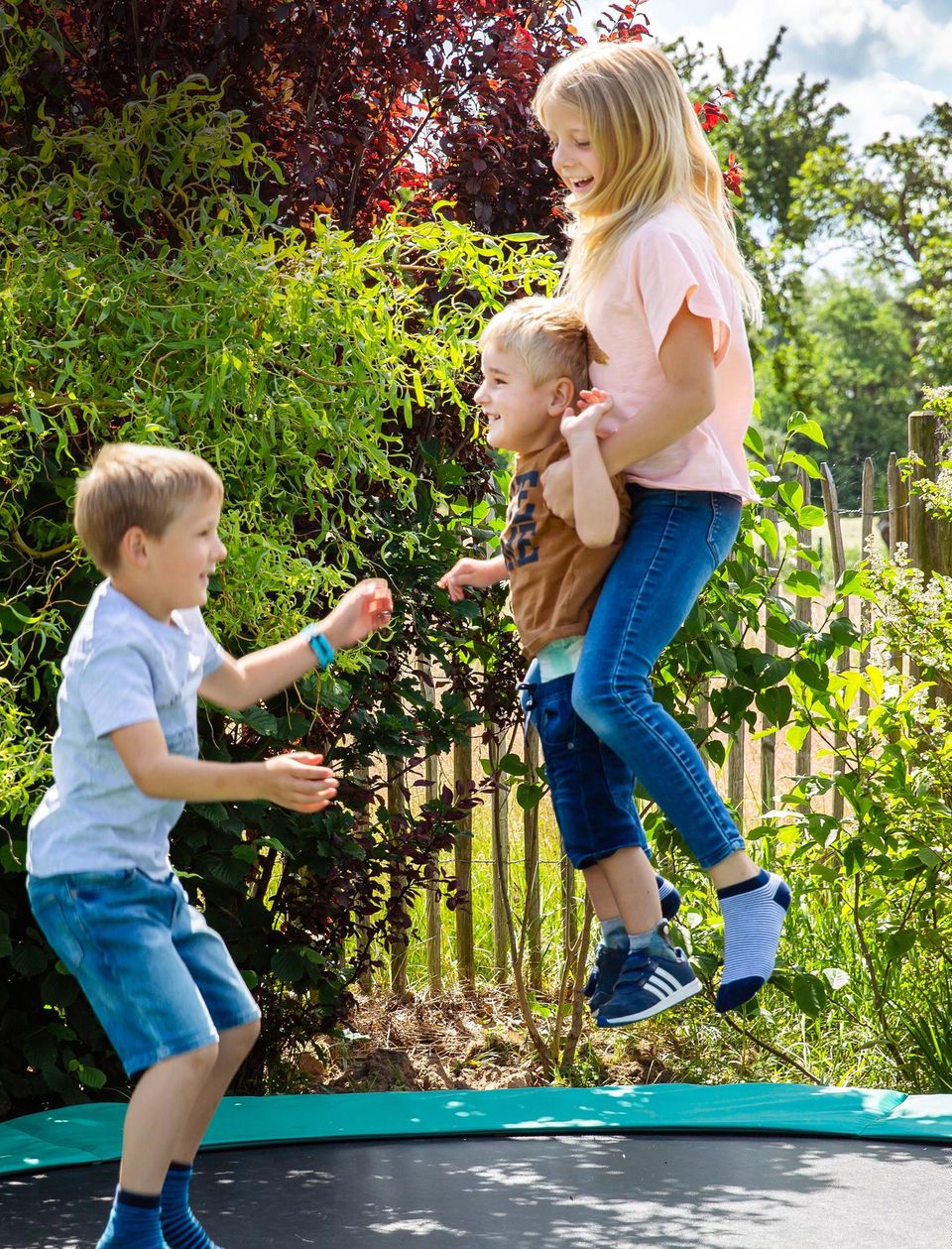
Kalle is now four years old. He's still a real fighter. When he was released from the hospital, he could not drink, move his arms and legs, and his gaze was constantly directed upwards to the left. But after a short time I was able to put it on and breastfed him until he was one year old. Today, although he has a severe visual impairment, he usually walks around with a happy laugh – and recently even without a walker. He can eat independently and say individual words and goes to an integrative kindergarten where the children without disabilities deal with him completely normally and at ease. Due to the risk of infection from Corona, however, we are leaving him at home at the moment, as his immune system is weaker than that of others. I have finished my studies and work part-time as a doctor in the children's hospital. Kalle digs in the dirt and we go on vacation as a family. I would say we are an exceptionally happy family with four wonderful children, each with their own special features and enriching our lives in their own way.
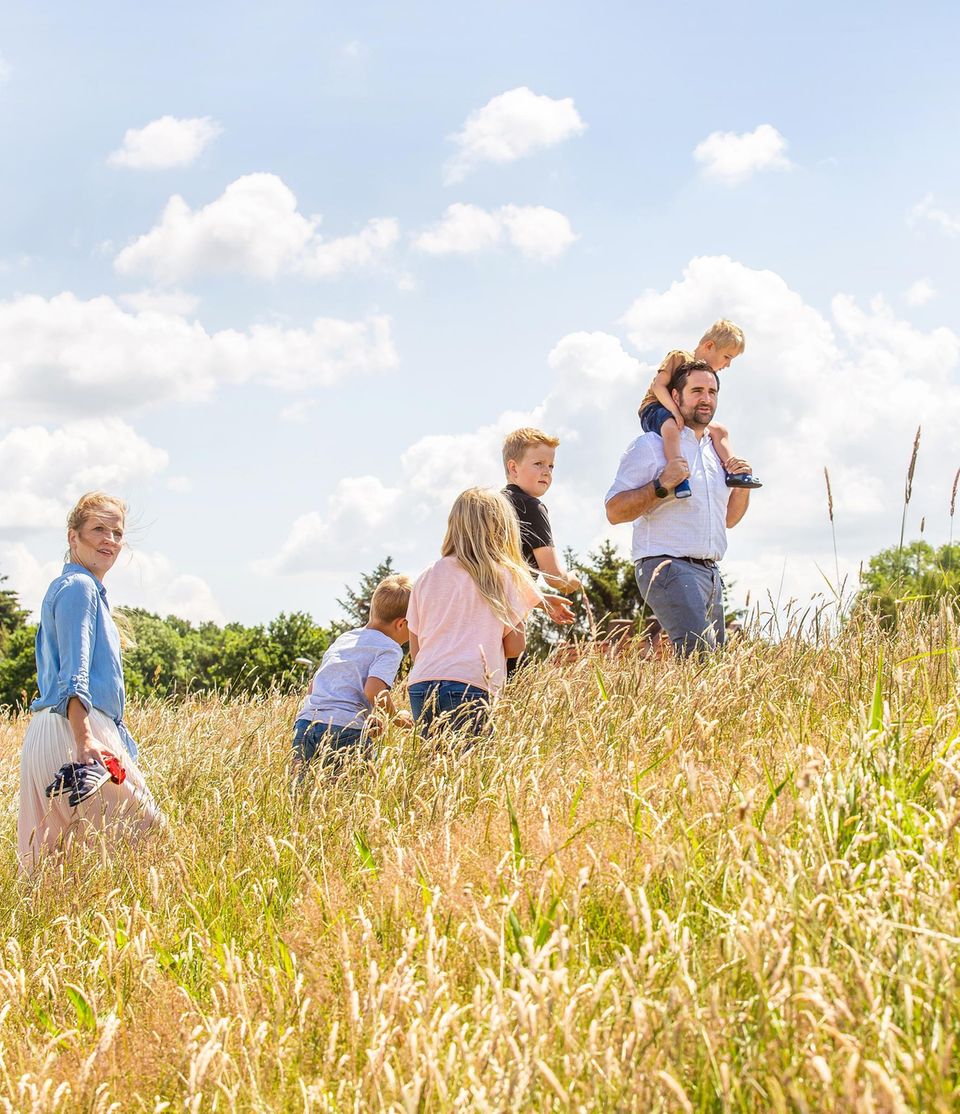
Organ donation in Germany
- Around 9,000 people in Germany are on the waiting list for a donor organ. In 2019 there were 932 organ donors nationwide – much less than needed. By far the most urgently needed are kidneys. Many sick people are also waiting for a donor liver or a new heart.
- The Transplantation Act (TPG) regulates the donation, removal, placement and transfer of organs that are donated after death (or during one's lifetime).
- The requirements for the removal of organs from the deceased and the living are precisely defined by law. In the case of a donation after death, two doctors must independently determine the ultimate, irrecoverable brain failure before an organ donation can be carried out. In addition, the donor's consent must be available – for example in the form of an organ donation card or an advance directive (consent solution).
- In most European countries, unlike in Germany, the rule of contradiction applies: All citizens who do not expressly object are therefore potential organ donors.
- Donors or their relatives in Germany have no influence on who will be the recipient of a donated organ. Organ donors and recipients as well as their respective families remain anonymous. So there is no way for one side or the other to get in touch.
- You can get an organ donation card free of charge at the registration offices, many medical practices, pharmacies and hospitals. He can also take organspende-info.de can be downloaded or ordered via the organ donation information line on the toll-free number 0800/90 40 400. Continue reading: organspende-info.de
Would you like to read more about the topic and exchange ideas with other women? Then take a look at the BRIGITTE community's "Children's Health Forum" past!
Get the BRIGITTE as a subscription – with many advantages. You can order them directly here.
